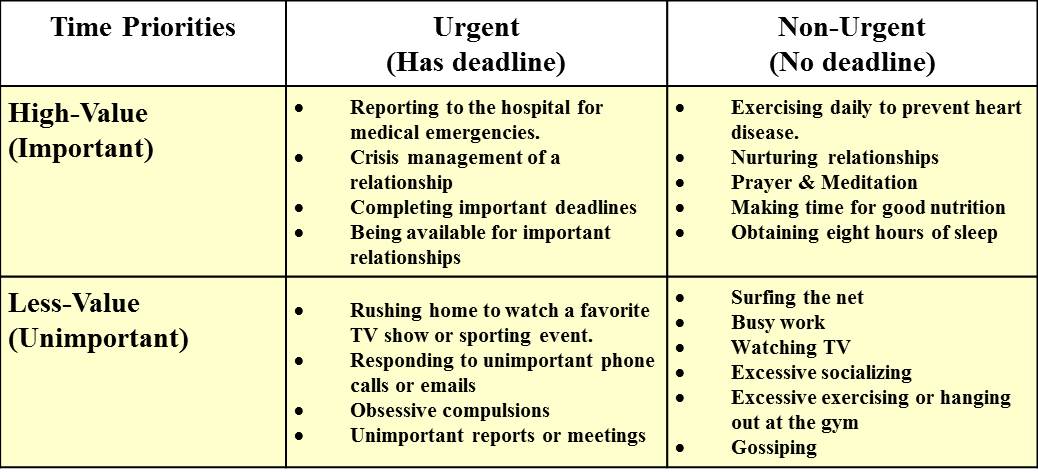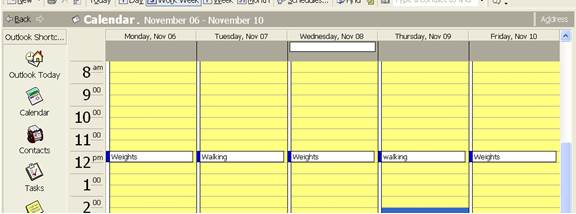Time Management
The ultimate wellness tool
No wellness program will succeed unless we manage to include the program in our time schedule. I am convinced that the limiting factor in our lives, when it comes to healthy life choices, is not knowledge or motivation, but time. We as a society have become slaves to the clock, and have suffered from the tyranny of the urgent. We are all subject to daily deadlines that push important agendas aside in favor of urgent demands. As the years pass, we spend our lives putting out urgent little bushfires, while behind the scenes, a huge forest fire of neglected important priorities rages out of control.
What is the difference between urgent and important priorities? An urgent commitment is something that must be done right away to avoid certain consequences. A mandatory last-minute meeting is called. Your boss tells you to prepare a detailed brief by tomorrow. By definition, urgency requires that it takes the highest priority.

Importance by contrast may or may not be urgent, but has profound ramifications. For example, exercising three to six times per week is extremely important to maintain good health, but each individual exercise session is not urgent. If years go by with the substitution of urgent priorities for important items in life such as exercise, maintaining healthy relationships, and healthy eating, then one day you may find yourself suffering from an urgent health condition such as heart disease or diabetes that could have been avoided by proper diet and exercise.
“Someday” Never Comes
We fool ourselves into thinking that after this next set of deadlines that I will have time for my family or to exercise. The truth of the matter is that we will never have time to get everything that needs to get done, done, let alone have time to relax or exercise.
The danger of putting items that are important such as relationships, recreating, exercise, etc. into the non-urgent, unimportant category is that a slow insidious decline in mental, spiritual and physical well-being takes place.
Waiting for that “someday” when you have more time embraces a passive approach to maintaining wellness. To correctly prioritize your time, you must reject passivity and proactively create a schedule that includes important priorities such as rest, exercise, and relationships. At first it may be difficult to say no to urgent less important commitments in order to take your afternoon walk with a friend or spouse, but the long-term dividends are worth it.
With time and practice you will develop discernment in determining what is important and what is not; and what is urgent and what is not.
Tips
Prioritize wellness appointments on your calendar. Your exercise program, family time, and your personal quiet time should all be treated as scheduled events, and your calendar should reflect it. Protect these commitments. For instance if you are asked to meet with a vender who has stopped by unexpectedly, but meeting with the vender would interfere with your scheduled exercise program, you could rightfully decline the interruption because of your “prior engagement.”
Combine your events. You may want to meet with a colleague while walking or playing golf. You can arrange to play racquetball or walk with a family member to promote exercise and relationships.
Use a pedometer or “stepometer” as a motivational device to increase your activity level. Wear a step-counting pedometer or stepometer for several days to learn how many steps you take in a typical day. Use the average daily step count as a baseline. Once you learn how many steps you average, take action to increase the number of steps that you take. At work, walk to personally deliver some messages rather than using email. Park your car farther away when you run errands. Try to walk 6,000-10,000 steps per day, depending on your fitness level and starting point.
Plan ahead and have healthy snacks or meal replacements available. If you become overly hungry you may be tempted to eat fast food or a candy bar. Also, having snacks available will allow you to squeeze in exercise at lunch and on breaks. Keep in mind that healthy habits are important, and once you break the habit of exercise or proper eating it is difficult to begin again.
Take Command of Your Calendar
Healthy time management requires forethought and planning. To control your time, you must proactively set your own priorities and align your calendar with your priorities. A healthy lifestyle will not happen without being a good steward of your time. Use your calendar to make an appointment to exercise everyday. Soon your associates will know not to interfere with this ritual. Place a high priority on that scheduled appointment; do not be tempted to allow other priorities to crowd this appointment out of your schedule.

Your calendar is a reflection of your priorities in life. What does it look like? Do you spend time with your family and friends? Do you exercise? Do you allow time for proper sleep and nutrition? Or does your calendar reflect long hours at work? Wasted time on the computer or watching TV? Do you spend time on activities that do not have long-term value? Hard work is admirable, but strive to work hard on your projects with the highest payback and then go home. Do not get in the trap of working longer and harder on projects that do not have a lasting value.
Freedom from Bondage
To the best of your ability, control your schedule and do not let others dictate your priorities. Once you have created the habit of managing a healthy calendar you will be freed from the bondage to urgent but inconsequential interruptions and will be on the road to a healthier lifestyle.
